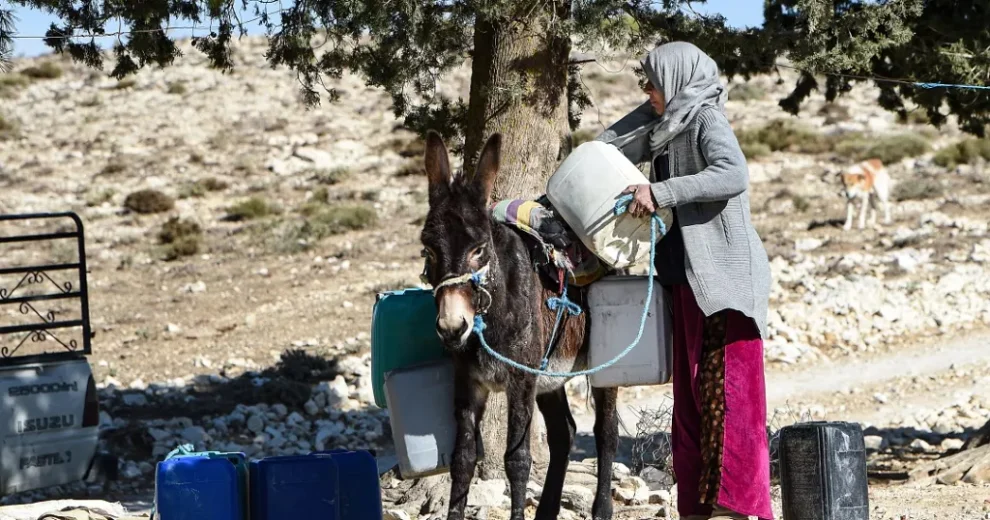57-year-old Ounissa Mazhoud lives in Tunisia’s remote village of Ouled Omar, 180 kilometers (110 miles) southwest of Tunis.
She wakes up every morning with one obsession: finding water. She walks to fetch water at the village’s last spring.
Today she went with her cousin Djamila. Both women lead a donkey, with two jerry cans tied to it, and cautiously descend a stony hill towards the last local source of water in the village.
Tunisia is the 33rd most water-stressed country according to the World Resources Institute.
The north African nation is in its fourth year of drought and inhabitants of rural communities are grappling with the nation’s worst water scarcity in years.
Mazhoudi feels abandonned by authorities: “We are the living [who are] dead, forgotten by everyone.”
“We have no roads or water, no help or decent housing. We own nothing. Are we Tunisians? No, because here we are not considered as such, Why? Because we lack a lot of things.”
In March, authorities introduced water rationing even in major cities. Many residents in rural areas don’t even have taps and rely on springs. Some farmers sold livestock to provide for their family and the rest of their cattle.
“There are several families who have left the village, Djamila Mazhoud says.
“Elderly people left due to water scarcity. They followed their children to the city so they could live, leaving their houses empty. The reason is thirst. Can an 80-year-old go to the river to get water? No way,” the 60-year-old says.
Pushed to move
The only road that leads to the village is decrepit and hasn’t been paved in decades, and residents say this only deepens their sense of isolation.
Some villagers have felt pushed to move to urban areas or abroad.
About 300,000 of Tunisia’s 12 million people have no drinking water in their homes, according to the Tunisian Forum for Economic and Social Rights.
Ramzi Sebtaoui, a stockbreeder in his thirties, brings water to his family every day by driving to the closest source, some 20 kilometers away in the city of Maktar.
“Two or three years ago, the situation was much better, with many natural springs that we could use to give water to the livestock,” he says.
“Today, due to climate change, almost all springs are dried up and all roads are destroyed. We have difficulty moving around. Today, our only request is to have paved roads and water for this village.”
Some 100 people live in Ouled Omar.
Residents traveled almost 50 kilometers to the city of Siliana on November 28 to protest outside governorate offices, demanding a paved road and access to clean water.
The World Bank predicts that by 2030 the Middle East and North Africa region will fall below the “absolute water scarcity” threshold of 500 cubic meters yearly per person.
Tunisia, already the 33rd most water-stressed country according to the World Resources Institute, has dropped to 450 cubic meters per inhabitant.
Source : Africa News











Add Comment